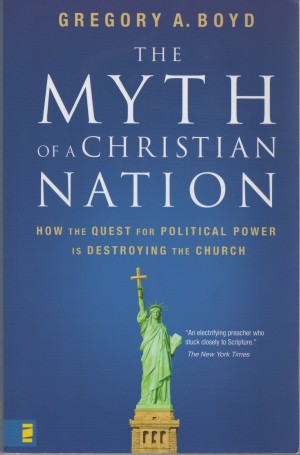The Myth of a Christian Nation by Gregory A. Boyd (2005. Zondervan. ISBN 978-0-310-26731-7)
To be sure, there is much to be admired in an Evangelical theologian who understands the hypocrisy of many Americans who label themselves “God fearing, fundamentalists” but who evince hate and animus and disgust towards those they do not agree with politically, socially, or theologically. That’s how Gregory Boyd begins his message of restoring the Kingdom of God and ignoring the Kingdom of the World and it remains his singular message until the last chapter in the book.
There’s no doubt that Boyd’s message: Placing yourself under folks who disagree with Christ’s message of universal love and sacrifice (to the point of martyred death) rather than ruling nonbelievers from above (or being in a position over non-Christians or other sinners by means of worldly power) is exactly what Jesus was driving at. And, as a self-styled Liberal Christian (having been born and raised Episcopal and having joined the ELCA Lutheran Church a year ago), I was gratified, in an “over them” sort of way, that an Evangelical (Boyd) was pointing out the very large sticks I’d always smugly discerned protruding from the eyes of conservative Evangelicals who judge other folks (like me) on moral issues such as abortion, same sex marriage, and the like. But Boyd’s premise, that Jesus never judged anyone, including sinners, extends beyond moral debates surrounding contemporary social issues of our time. His line of thought becomes far more troubling when you distill his premise to its essence as he does in the last chapter of the book.
The concept Boyd advances at the end of The Myth of a Christian Nation is simple enough: Yes, there are bad people and even bad governments. Such folks and forces have existed ever since The Fall. Boyd’s analysis is that God’s former view of things was to allow men to work it out, to see if his chosen people, the Jews, couldn’t sort through the discord and the sin and become a unifying and dominating force in the world. That idea didn’t work, and, by the time of Jesus’ coming, the Romans had taken over most of the known world, ruling over the Jews and other nationalities by installing the Romans’ version of the Kingdom of the World. Boyd argues that, no matter how moral, no matter how just a war may be (including WWII to free the world of Hitler and save the last of the Jews; or the hunting down and killing of those behind 9/11/2001), such wars are of the Kingdom of the World and have nothing to do with the Kingdom of God. He cites Jesus’ own words, and those of the early Christians like Paul, to draw a red line: Christianity does not, even in cases of self-defense, acquaint the use of violence of any sort with the Kingdom of God. Period. No exceptions. It goes without saying that the hypothesis behind the author’s discourse is indeed theologically and, ultimately, sound. If every Christian simply “turned the other cheek” (even when confronted with the rape of a loved one, or a murderous crazy person in an elementary school with assault weapons) over time Christ’s admonition to turn the other cheek will prevail and establish the Kingdom of God here on earth. If every Christian refused to fight and instead offered our opposition (in politics, war, and on moral questions) love instead, well, Boyd’s premise would likely see fruit: War, poverty, envy, and all other sin would eventually disappear.
But here’s the rub. Boyd forgets an important caveat in his pronouncements on the road to blueprinting the Kingdom of God. We are not Christ and, so far as I can tell, never will be like Christ because, as hard as we try to strive for Christ-like sacrifice and perfection, we are not part of the triune God. We are simple human beings and will remain so, subject to our emotions, our anger, and our struggles.
My brother judge Dale Harris passed this book on to me. When I told him I respected much of what I’d read (I was about 2/3 of the way through the book when we spoke), Dale said: “Wait until you read the last chapter. He lost me there.”
I won’t say Mr. Boyd lost me in the last chapter, where he attempts to persuade his readers that Christians cannot, if they serve the Kingdom of God, resort to self-defense or answer their nation’s call to military service under any circumstance. I understand his point and I don’t think I have the background to challenge his theology. But I remain unconvinced that humans have the genetic makeup to do exactly what Jesus urged us to do, especially if it requires us to watch loved ones or other innocents lose their lives or their dignity to evil.
4 stars out of 5. This book challenges beliefs held by not only Evangelicals but all people of faith, Christian and non-Christian alike.



